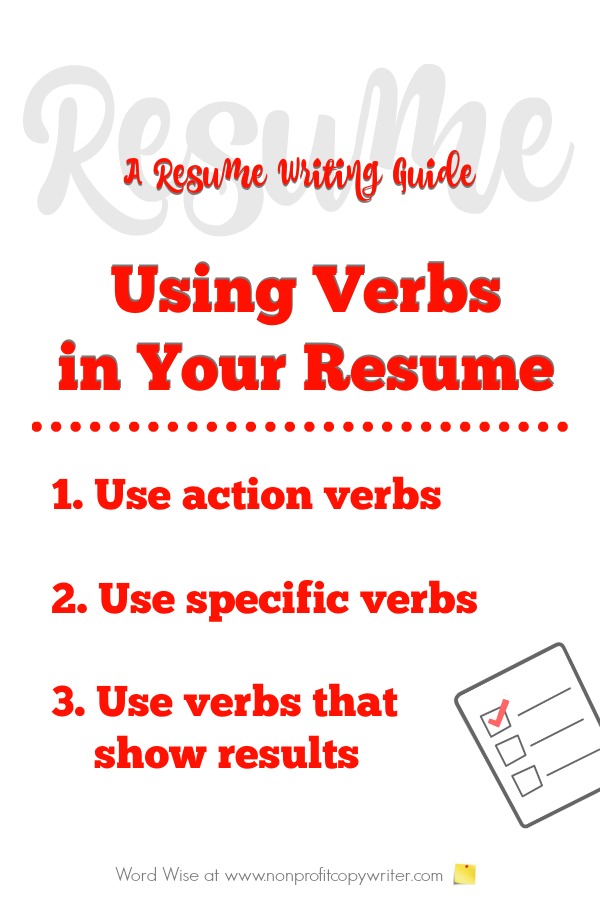Save Time: Get 5 Simple Writing Tips
you can put to use in 10 minutes
A Resume Writing Guide to Using Verbs
How-Tos for Words That Show Action
No resume writing guide is complete without a section on verbs.
Award-winning writer Kathy Widenhouse has helped hundreds of nonprofits and writers produce successful content , with 750K+ views for her writing tutorials. She is the author of 9 books. See more of Kathy’s content here.
Verbs are all about action – things you do. And your resume is a snapshot of what you do and what you have done thus far in your professional life – so an employer can get a picture of what you will do for him.
(If you want to be technical about it, some verbs show a state of being rather than show action. But you won’t use “be” verbs like that in your resume. More about that in a minute.)
Get Your Reusable Resume Builder here.
Resume Writing Guide to Using Verbs: Use Action Verbs
Your resume should be energetic and vigorous. You can produce that kind of content when you use strong action verbs.
Action verbs describe what you do
The strongest verbs reflect activity that others can see.
Notice the difference between the two examples below. An employer might not get excited to read that you “conceptualized” (first example) but he will sit up and take note that you “created” a strategy.
1. Conceptualized new online and social media strategy
2. Created new social media strategy to increase traffic by 44%
Action verbs are specific
Specificity is upbeat and demonstrates productivity. Use the most specific verb that you can in order to reflect positive results.
Notice the contrast between “changed” (less specific) and “updated and simplified” (more specific) in these two examples. Specific verbs lend themselves to include further details.
1. Changed the filing system
2. Updated and simplified the filing system for 10 intranet stations
Action verbs show results, not just duties
Use verbs to show outcomes, not responsibilities. Outcomes reflect results. In these two examples, see how “responsible” merely lists a duty while “created” and “implemented” demonstrate action and results.
1. Responsible for internship application process
2. Developed and implemented a summer internship application process that attracts 100+ candidates yearly
More Resume Writing Guide Tips for Using Verbs
Tip: Use Verbs at the Beginning of the Sentence
Sentences in your resume are not like sentences you use in letters, articles, blog posts, or even social media. In a resume, the subject of each sentence is understood and it is YOU. In your job experience section, start sentences with verbs. You can leave off the “I.” And resist the temptation to bury the verb in the later part of the sentence or worse yet, leave it off entirely.
- Participation rate increased by 72% (note: this doesn’t credit you for the increase because this sentence doesn’t show you doing the action)
- Led program promotion to increase student participation rate by 72%
Tip: Use the Correct Verb Tense
Use present tense to describe your current job. Use past tense to describe past jobs and your responsibilities.
- Produce monthly online communications, including market positioning, writing, editing, loading, and scheduling, to a list of 5,000 subscribers (Current job)
- Planned and implemented an annual campaign that led to a 27% increase in monthly subscribers (Past job)
Tip: Avoid Using Helping Verbs
Also called auxiliary verbs, these verbs achieve precisely what their title suggests: they “help” the main verb. But when used in resumes, helping verbs weaken your resume content and add unnecessary words. And guess what? Helping verbs are not needed in order to communicate your achievements in your work. So zap them!
- With Helping Verbs
I was supervisor during 2011 when the company had merged with UniTeach. - Without Helping Verbs
Supervised during the 2011 company merger with UniTeach
Tip: Eliminate These Helping Verbs
am, are, be, been, can, could, did, do, does, had, has, have, is, may, might, must, ought to, shall, should, was, were, will, would
Get the Worksheet
Check out this Resume Worksheet to organize the information you need for your resume.
More Tips on Writing Resumes
Build a resume with this Reusable Resume Worksheet Builder ....
Basics about writing a resume ...
Parts of a resume: a primer ...
Tips for writing resume objective ...
3 main resume writing formats ...
Quiz: which resume writing format should you use?
Resume writing tips: easy do's and don'ts ...
Build a winning resume with a resume worksheet ...
Writing a good cover letter: a step-by-step writing guide ...
Cover Letter Writing Tip: get the reader to take one step ...
More Resume Writing Tips on our Pinterest board...
Return from Resume Writing Guide for Verbs to Nonprofit Copywriter home
As an Amazon Associate I earn from qualifying purchases.
Share This Page

Named to 2022 Writer's Digest list
BEST GENRE/NICHE WRITING WEBSITE


Stop Wasting Time!
Grab your exclusive FREE guide, "5 Simple Writing Tips You Can Put to Use in 10 Minutes or Less"












